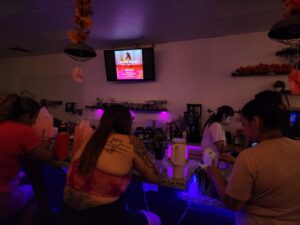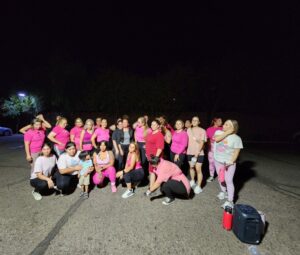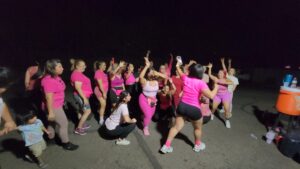- Slug: Mental Health Maternal Mortality. 920 words.
- 3 photos available (thumbnails, captions below).
- Story voiceover available.
By Nicollette Valenzuela
Cronkite News
PHOENIX – “Can we skip straight to the empowerment session?” shouts someone from a crowd at a small, dimly lit shop with a fluorescent pink glow. The “empowerment session” gathers more than 30 participants every Tuesday night at The Daily Mix Nutrition store in Avondale.
After a battle with postpartum depression, Yormheri Munguia, the store’s owner, and Jennie Parra, a women’s transformation coach, recently started the Women’s Empowerment workout.
“I was diagnosed with postpartum depression. … They right away offer medication like here, take this medication and you’ll feel better,” Parra said.
Parra added that while medication may be a quick fix to depression, it eventually fades and does not have a lasting impact. “I genuinely feel like the body is meant to heal if you feed it properly, if you take care of it, if you move your body,” Parra said.
While the World Health Organization defines maternal mortality as deaths that occur during pregnancy, childbirth or within 42 days of terminating a pregnancy, the Maternal Mortality Review Committee (MMRC) of the Arizona Department of Health Services (ADHS) tracks and reports all deaths during pregnancy or within the first year after the end of a pregnancy.
“I remember not taking care of myself and going … into postpartum depression, the baby blues. Very mild but … once we implemented good nutrition, I decided to join Herbalife, the community, and I felt empowered,” Munguia said.
Munguia said she lost weight and gained clarity and understanding, which ultimately helped her change her mindset. “If we are good, our family is going to be good,” Munguia said.
The United States leads in maternal mortality cases in the developed world, with Arizona ranking 11th in the U.S., according to the Centers for Disease Control and Prevention (CDC) data from 2018-2022.
“In Arizona, the last two reports have had maternal mental health as the top contributor to maternal death, so that is a consistent trend,” said Elizabeth Wood, a MMRC member. The next highest contributor is substance use disorder, and the majority of these deaths are preventable, according to the ADHS report.
This year, the CDC increased the amount of the grant from $450,000 to $570,000 a year with a 5-year commitment, aiming to reduce the number of pregnancy-associated deaths. The funds will help ADHS connect with affected families, speed up the case identification and review processes and share prevention resources.
“What that program does is it funds the Maternal Mortality Review Committee and … one of our goals is to maintain and improve the diversity of the maternal mortality review members,” said Mary Glidden, the Fatality Review Office chief at the ADHS.
The chances of surviving pregnancy and childbirth vary based on race and ethnicity across the U.S., and Arizona is no different. The state’s population impacted the most is American Indian and Alaska Native, with a reported 233.9 deaths per every 100,000 live births. This ratio is 166.8 for Black women, 80.1 for white and 72 for the Hispanic population.
“Nationally, Black and Native American women experience disproportionately higher rates of maternal mortality, and this disparity is certainly reflected in Arizona as well. So ensuring a diverse committee … helps to broaden those discussions we have and develop robust recommendations that aim to meaningfully engage communities for those prevention efforts,” Glidden said.
The majority of pregnancy-associated deaths occur in rural parts of the state’s northern, western and eastern regions, which are home to many of the state’s 22 federally recognized tribes. A combined 228.9 deaths per 100,000 live births were reported in the mentioned regions, according to the ADHS report. These parts of the state do not have access to maternity care services.
“Many hospitals are closing because they don’t feel like they can fully staff with OB-GYN doctors, and they can’t afford the malpractice insurance. So, they close down and then they strand some mothers an hour and a half from the hospital where they might give birth,” said Steve Calvin, associate professor of obstetrics and gynecology in the division of Maternal Fetal Medicine at Banner University Medical Center in Phoenix.
Overall, ADHS reported 43 cases of maternal mortality in 2018-2019, which increased the maternal death ratio by almost half, compared to the previous two years.
Besides limited funding in rural hospitals, the state lacks the resources to do comprehensive research on maternal mental health. “We do not have a single study related to perinatal mental health specific to Arizona,” Wood said. Mental health care providers do not reflect those they serve, Wood said, contributing to misunderstanding, “so growing our providership here that is more reflective of populations which they’re serving would reduce the stigma while improving the outcomes because people would feel like they were being heard and understood for the culture they come from and the persons they are.”
Back at The Daily Mix Nutrition shop, women are celebrating a 21-day challenge completed by two participants: One lost 12 pounds and the other lost 10, both saying feeling “amazing” and “loving” how it feels. “This community is for you,” said Parra, the workshop coach, as applause and cheers erupted.
Parra said no one has to go through this journey alone. “I just feel like it’s not talked about enough. I feel many people struggle with their mental health and they either are afraid to speak about (it) or they feel like they have to go through it alone. And (by) creating space I want women to feel like hey, I’m here for you, anything you need and vice versa.”
For more stories from Cronkite News, visit cronkitenews.azpbs.org.


